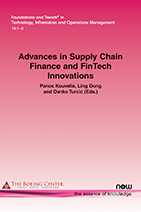Managing Disruption Risk Over the Product Life Cycle
By Vadim Glinsky, Kellogg School of Management, Northwestern University, USA, vadim.glinskiy@kellogg.northwestern.edu | Sunil Chopra, Kellogg School of Management, Northwestern University, USA, s-chopra@kellogg.northwestern.edu | Florian Lücker, Cass Business School, City, University of London, UK, florian.lucker@city.ac.uk
Abstract
In this article, we focus on managing disruption risk over the life cycle of a product. We consider two disruption mitigation strategies: holding risk mitigation inventory (RMI) and ordering from a reliable supplier. Our goal is to determine how the two strategies can best be used over the life cycle of a product where future demand is influenced by current sales that may be affected by supply disruptions. Our insights based on numerical analysis indicate that the optimal actions are impacted by the fact that future demand is affected by current sales over the life cycle. This results in optimal behavior that may be quite different from what has been proposed in the literature where demand over time has largely been assumed to be independent of current sales. For example, we show that the order quantity from an unreliable supplier may increase in the probability of disruption.
Emerging Advances in Supply Chain Finance and FinTech Innovations
Advances in Supply Chain Finance and FinTech Innovations examines three themes:
Financing Issues in Supply Chains look into popular working capital management financing practices: trade credits and guarantor practices including advanced trade credit practices in supply chains, guarantor financing practices for capital constrained retailers, and innovative practices of joint financing of capital constrained firms by a bank.
FinTech Innovations for Supply Chains examines business model innovations for supply chain financing supported through new platform technologies (such as blockchain), and simple financial technologies effectively implemented for high impact in supply chain risk management.
Advances in Risk Management of Operational Systems provide state-of-the art thinking on many risk issues in supply chain operations including disruption strategies over the product life cycle, the production planning complexities for a capital constrained manufacturer that uses Inventory Based Financing (IBF) scheme to fund its working capital needs, capacity procurement decision, capacity planning in the presence of demand and price uncertainty, and valuing complex real options in dynamic operational settings.

Companion
Foundations and Trends® in Technology, Information and Operations Management, Volume 14, Issue 1-2 Special Issue: Advances in Supply Chain Finance and FinTech Innovations
See the other articles that are also part of this special issue.